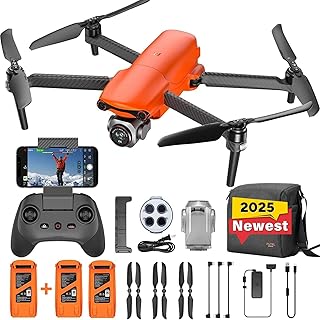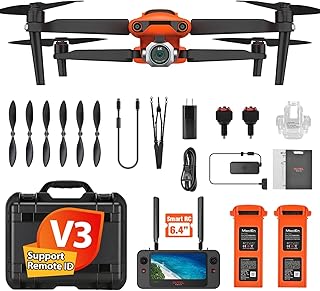Autel Drones for Search and Rescue: Effectiveness and Limitations
Autel drones, like the Autel Evo II series, are increasingly used for search and rescue operations. Their effectiveness depends heavily on the specific situation and the capabilities of the chosen drone model. Here's a breakdown of their strengths and limitations:
Strengths:
* Cost-effective: Compared to traditional search and rescue methods like helicopters, Autel drones are more affordable and easier to deploy.
* Flexibility: They can access difficult and dangerous terrain, like dense forests or collapsed structures, that are inaccessible to humans.
* Fast Deployment: Drones can be deployed quickly, allowing for faster response times in emergency situations.
* Advanced Imaging: Autel drones can be equipped with various sensors, like high-resolution cameras, thermal imaging cameras, and LiDAR, providing detailed information about the search area.
* Long Flight Time: Some Autel models offer impressive flight times, allowing for extended searches without needing to return to base.
* Live Video Feed: The operator can see real-time footage from the drone, enabling immediate assessment of the situation and efficient coordination of rescue efforts.
Limitations:
* Limited Range: Even with longer flight times, drones still have a limited range, restricting their use in vast search areas.
* Weather Dependence: Wind and precipitation can significantly impact drone performance, hindering search efforts in unfavorable conditions.
* Operator Expertise: Effective operation requires skilled pilots and trained personnel to interpret the collected data and make crucial decisions.
* Regulations: Drone use for search and rescue is subject to regulations and licensing requirements, potentially slowing down deployment and operation.
* Limited Payload: Drones have limited payload capacity, restricting the amount of equipment they can carry, like rescue supplies or medical equipment.
* Reliability: Drones are susceptible to technical failures and battery life limitations, requiring backup systems and careful maintenance.
Overall Effectiveness:
Autel drones can be a valuable asset in search and rescue operations, offering several advantages over traditional methods. However, their effectiveness depends on factors like the search area, weather conditions, and the expertise of the operators. It's important to understand their limitations and carefully assess their suitability for each specific situation.
To maximize effectiveness:
* Choose the right drone model: Consider factors like flight time, payload capacity, and sensor capabilities.
* Train operators: Ensure skilled pilots and experienced personnel are available to operate and interpret data.
* Collaborate with other agencies: Integrate drone operations with established search and rescue protocols and collaborate with other emergency responders.
* Develop clear protocols: Establish standardized operating procedures for drone deployment and data collection.
While Autel drones offer a promising tool for search and rescue, their effectiveness should not be overestimated. They should be used in conjunction with other methods and under careful consideration of their limitations.


